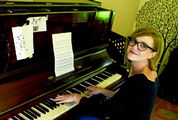THEATRE director Thando Doni is one of several successful graduates from the training programme run by Cape Town’s independent Magnet Theatre.
Doni, nominated for a Fleur du Cap best director award this year, won that accolade in 2012 in the Baxter Theatre’s Zabalaza Theatre Festival. He trained through Magnet Theatre’s Arts and Media Access Centre (AMAC), showing "incredible promise", says the theatre’s co-director and trustee Jennie Reznek.
The centre’s programme is just one of several training programmes of various levels run by the theatre, which is now 28 years old. In that time Magnet Theatre has created 30 award-winning productions that have toured four continents and 24 national and international festivals.
In February Reznek’s I Turned Away and She Was Gone received four Fleur du Cap nominations. The awards focus on professional productions staged in and around Cape Town.
Arts and Media Access Centre is a two-year full-time training programme, the pinnacle of Magnet’s many training programmes. It has produced 19 first-time (in their family) university graduates — centre graduates are often encouraged to also study at the University of Cape Town (UCT). Each Arts and Media Access Centre student is also involved in their own income-generating projects.
Seventy-one percent of the graduates of this programme are regularly employed in the creative economy, and 27 self-generated productions have been created since 2010.
Another centre graduate is Angola-born Maggie Fernando, who grew up on the Cape Flats. "My teacher sent me to audition for Magnet," she says, adding that she also had an audition at UCT planned, but refused to go after her appearance at Magnet. "I honestly don’t know why," she says, "but Mark (Fleishman, the theatre’s other director and managing trustee) and Jennie insisted I go to UCT. I said I would go after I finished the AMAC training."
Fernando now has a UCT diploma in theatre making and is an intern in Magnet Theatre’s Culture Gangs programme, which offers support to existing drama groups in Cape Town. She describes the centre’s programme as "extraordinarily diverse" and says it gave her the confidence to enter that place she feared — UCT.
"Never did I think I would be in a university, but when I went I didn’t look down on myself, being on financial aid. I had confidence."
Reznek, who started training people for the theatre when she came back to SA from studying in France’s L'École Internationale de Théâtre Jacques Lecoq in 1986. "I came back feeling I had been given the gift of myself and I suppose I had a desire to share that empowering sense of confidence," says Reznek. "Also, there was such a huge need among the youth and we really must try not to waste their potential, it’s so important to tap into it."
Reznek and Fleishman started Magnet in 1988, naming it after the street in which they were staying in Johannesburg. "We are now an education trust, although the production work is still at the "top of the pyramid", says Reznek.
Other training programmes include the theatre’s Culture Gangs. It exposes the city’s young people to theatre, offering them an alternative to the lure of gangsterism and other forms of crime. "We run workshops according to their needs, it could be script writing," says Reznek. The programme also uses a subsidy from black empowerment entity, Hosken Consolidated Investments, to bus Cape Flats youth to theatres across Cape Town, including the Baxter, the Artscape and the Fugard.
In the Cedarberg region, north of Cape Town, Magnet runs an arts development programme that brings drama as a form of expression to under-resourced communities, with the aim of developing more drama groups in the area, providing skills training and supporting local drama groups’ participation in festivals and regional events and competitions. The theatre also works with local teachers.
Another rural programme is the Clanwilliam Arts Project, now in its 15th year.
"We want to meaningfully occupy young people’s time," says Reznek. "We want to help them avoid ‘bored activities’ that happen a lot in the townships when there is a feeling (that there is) nothing to do and no sense of a way out."
Funding, says Reznek, is "a big bottleneck", and she has had to learn to "manage a whole lot of multilayered grants". The cost per trainee for the Arts and Media Access Centre programme is R60,752.
"I grew up under apartheid," says Reznek. "As a white person it was not terrible to think you could just take." Magnet Theatre and its training programmes is her way of giving back.

















Change: -0.36%
Change: -0.29%
Change: 1.81%
Change: -0.81%
Change: -1.12%
Data supplied by Profile Data
Change: -0.97%
Change: -0.25%
Change: -0.36%
Change: 0.00%
Change: -0.47%
Data supplied by Profile Data
Change: 0.21%
Change: 0.09%
Change: 0.35%
Change: 0.52%
Change: -0.33%
Data supplied by Profile Data
Change: -0.32%
Change: 0.00%
Change: -0.20%
Change: 0.00%
Change: -0.26%
Data supplied by Profile Data